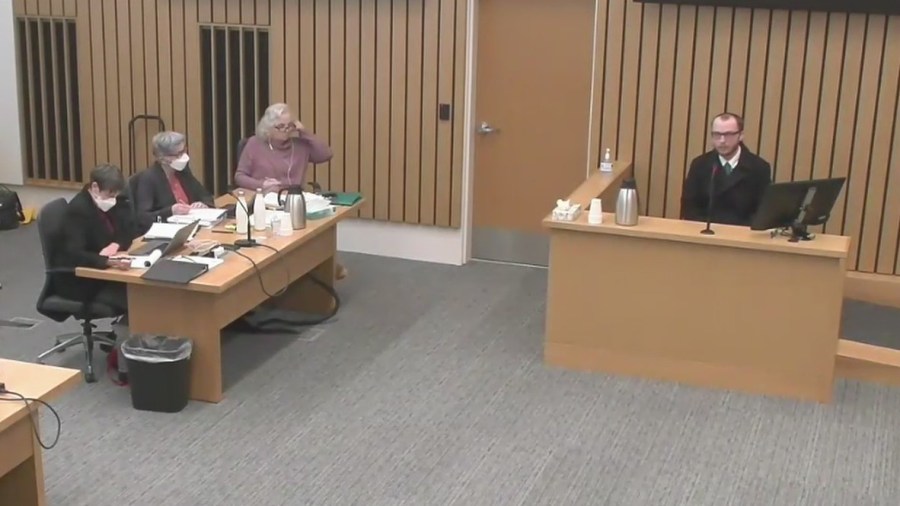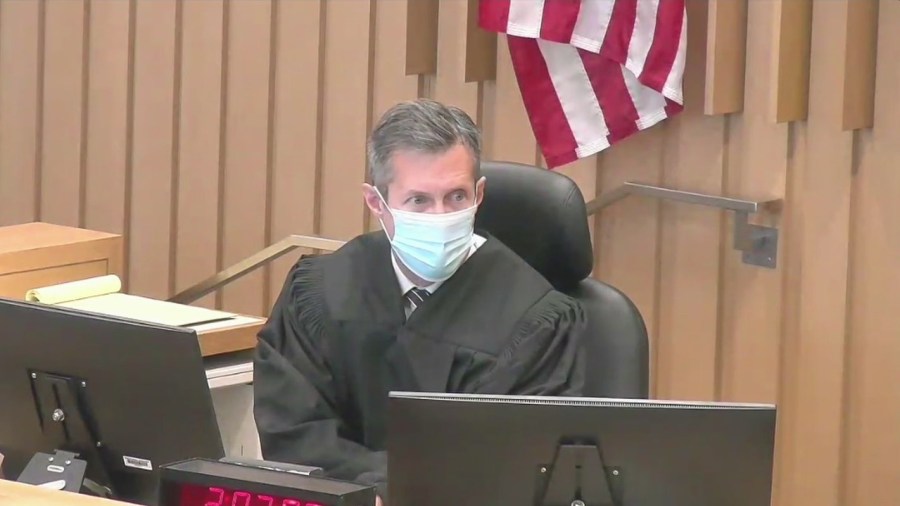PORTLAND, Ore. (KOIN) – On the fifth day of Nancy Crampton Brophy’s murder trial, the court heard how she reacted moments after learning of her husband’s death.
Crampton Brophy is accused of fatally shooting her husband, Daniel Brophy, at the Oregon Culinary Institute in Portland on June 2, 2018. Daniel worked at OCI as a chef and instructor. After Crampton Brophy learned about police activity at the school that morning, she said she decided to drive in to see what was going on.
At the scene, police told her that her husband was dead.
On Monday, the fifth day of the trial, Detective Anthony Merrill, the lead detective at the crime scene that day, testified once again. While on the stand, prosecutors played a recording of the moment detectives notified Crampton Brophy of her husband’s death on June 2, 2018.
The trial did not start until 2 p.m. Monday due to inclement weather. The two witnesses who took the stand before Merrill were Adam Johnson, an OCI student who arrived late to campus that day, and Kenneth Narcavage, an OCI instructor who was not working that day, but who spoke about working with Daniel.
They both repeated things other witnesses had stated: that Daniel was an excellent instructor and that Daniel did not speak much about his relationship with Crampton Brophy while he was working at OCI.

Here are five takeaways from Detective Merrill’s testimony and the recording of the moment detectives notified Crampton Brophy of her husband’s death.
No leads connected to students
Merrill said he spent several days after the murder returning to the crime scene and questioning students. Police officers not only interviewed students who were present in the school when Daniel’s body was discovered, they also contacted students who arrived late to class and students who didn’t show up to class that day.
He also reached out to homeless people who were known to frequent the area and did not find any investigative leads with them.
The day of the murder, Merrill said he was at the crime scene until 7 p.m. He said typically, if someone knows something or saw something suspicious near the scene of a crime, they’ll approach police officers and tell them. No one flagged him or other detectives down on June 2 or any of the other days he was there.
Crampton Brophy’s van caught on camera
Merrill said detectives collected surveillance video from several different locations near OCI, including Bellagios Pizza, East Side Deli, PGE, and KGW.
The Bellagios Pizza video was the first they reviewed the morning of the murder. Detectives had just finished informing Crampton Brophy of her husband’s death and interviewed her. Police offered to have detectives help drive her home and Merrill said he saw her gray Toyota minivan parked across the street. He was surprised to see what appeared to be the same van appear in the surveillance video he watched a short while later.
He said the gray van appeared in the video at 7:08 a.m. and then appeared again at 7:28 a.m. Investigators say Daniel Brophy was alive at 7:22 a.m. when he disabled the alarm at OCI, but believe he died shortly after that.
In the interview detectives just had with Crampton Brophy, she gave them a detailed description about how she’d been home when her husband left for work. She said she woke up while he was showering but stayed in bed. When he got out of the shower, she asked him to look at the leaking pipe under the sink. She did not mention leaving the house.
The Brophys bought a gun
In her interview with detectives, Crampton Brophy said she and her husband had bought a gun not long before he died. She said they bought it shortly after the Marjory Stoneman Douglas High School shooting. Crampton Brophy said she was concerned and told Daniel she thought they should get a gun and he said OK. She also said many people they knew owned guns, which she felt was another reason to get one.
She said they purchased a handgun at a gun show, but never used it. She said when they brought it home, they both decided they didn’t want it. They’d placed it on the top shelf of the closet and hadn’t touched it. She said there was still a piece of plastic attached to it that indicated they’d never used it.
“It was heavy and it felt terrible,” Crampton Brophy said in the recording of her conversation with detectives. “Frankly, I couldn’t imagine ever needing it.”
“I want him back!”

Several times in her conversation with detectives, Crampton Brophy grew emotional. She would cry, then seem to organize her thoughts and provide police with more information.
At one time, when Merrill explained there were resources that could provide her with assistance, and that detectives would be working hard on the case, Crampton Brophy began sobbing, saying that even if detectives find the person who killed her husband, it won’t bring him back.
“I want him back! That’s the part I want,” she said during her outburst. “I don’t care who shot him. I just want him back.”
Crampton Brophy provided a lot of details
Merrill said overall, death notification conversations with family members can be emotional, difficult and awkward. He said Crampton Brophy seemed to be acting like most family members would in that situation. He said she was a bit scattered, but still provided detectives with a lot of details. He said she seemed very lucid when describing the series of events that took place before Daniel left their home.
“It sounded like she had a lot of details that sometimes somebody wouldn’t have when I notify them,” he said.
He said sometimes, family members shut down and are overcome by emotion after detectives break the news to them.
